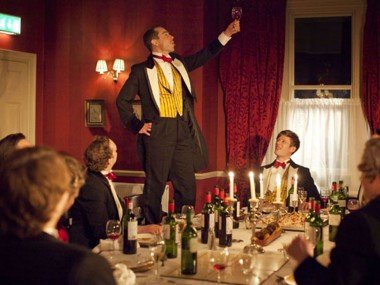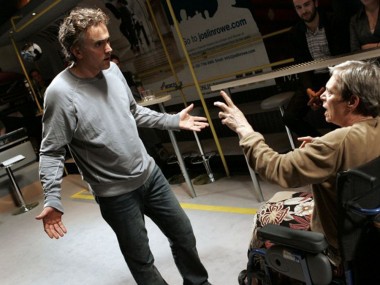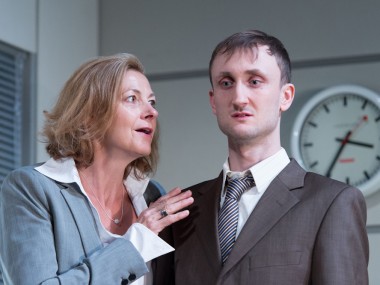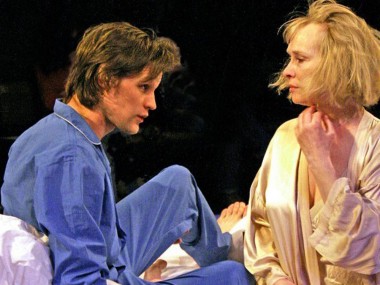British New Writing in an Age of Austerity
Monday 1st December 2014
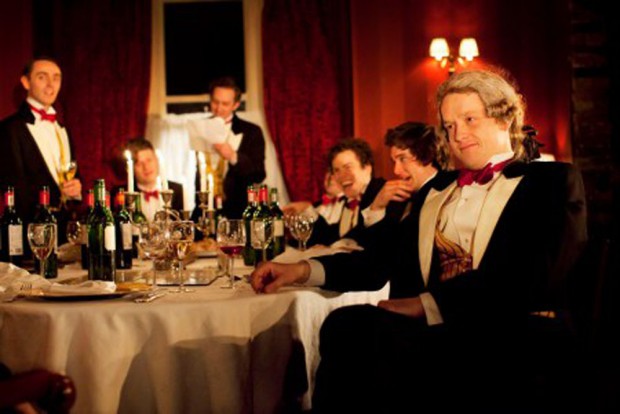
• Friday, 7 May 2010; Brixton, south London; darkest night. Early dawn touches a Victorian terraced house in an urban road with no trees. Inside, the Professor is preparing to go to bed. It is around 5am and most of the results of the previous day’s General Election have been declared. For the first time in postwar British history, no single party has a majority of seats in parliament. The incumbent New Labour Prime Minister Gordon Brown resigns, and there is talk of a Coalition government. Over the coming days, the Conservative Party, led by David Cameron, forms an alliance with the Liberal Democrat Party, and creates a Coalition government. Because of the global financial crisis, the new government immediately institutes a sharp new policy of austerity. Cameron tells the nation that “We are all in it together”.
But one young playwright has already contested this declaration. Laura Wade’s Posh opens at the Royal Court (London’s new writing powerhouse) a month before the General Election and is still being performed in its immediate aftermath. Its main characters are part of the Riot Club, which is based on the real-life exclusive all-male dinning clubs of Oxbridge, such as the Bullingdon Club (former members include Cameron, Chancellor George Osborne and London Mayor Boris Johnson). Posh features 10 young men, educated at public school and members of an elite undergraduate dining club, who believe that they have a right to rule. The rich and privileged — like Cameron and his government — represent a small and undemocratic elite class. Like a metaphor for the nation, this old class turns out to be inefficient, ineffective and cowardly. In its exploration of class and social advantage, Posh is a key cultural moment that accurately takes the temperature of the times. Behind its jokes and barbs there’s a noticeable anger. When it transfers to the West End in 2012, Wade updates it — and then rewrites it as a film in 2014 (under the title The Riot Club).
While this preemptive response to the new Conservative austerity government is timely, how do other playwrights articulate ideas at the start of the new age of budget cuts, belt-tightening and falling living standards? There are some signs of other contestatory plays. Mike Bartlett’s Earthquakes in London (2010) and 13 (2011) are epic and imaginative state-of-the-nation dramas at the National Theatre, although the main radical protagonist in both is an essentially religious figure, a prophet. And the addition of this religious element tends to dampen the political resonance. More ostensibly relevant are two plays about Green issues: Greenland by Moira Buffini, Matt Charman, Penelope Skinner and Jack Thorne, and The Heretic (2011) by the amusingly ever-sceptical Richard Bean. On a wider global canvas, debbie tucker green’s Truth and Reconciliation (2011) explores tense encounters in Zimbabwe and Rwanda, in Bosnia and Northern Ireland, or at the Truth and Reconciliation Commission hearings in South Africa, in fragmentary scenes in which the victims of violence and political oppression confront their persecutors. Like Posh, this is a play in which ghosts intervene in the lives of the living. Unlike Posh, Vivienne Franzmann’s Mogadishu and Andrew Sheridan’s Winterlong (2011) both explore the edgy world of the urban poor — the underclass not the middle class.
A handful of other plays explore big themes: the most notable are Drew Pautz’s Love the Sinner, which looks at religion and sexuality, and David Eldridge, Robert Holman and Simon Stephens’s A Thousand Stars Explode in the Sky (both 2010), which contemplates nothing less than the end of the world. So there is a division in new plays between those that remain rooted in a naturalistic reality and those that inhabit a more imaginative, sometimes spiritual, world. The trouble with plays about religious or spiritual themes is that often their politics are backward-looking, and unengaged. An easy way to avoid commitment is to prattle on about the spirit. Or to turn political anger into religious fervour. During a hard-line Conservative Coalition, imposing austerity on the poorest sections of the population, what has happened to the left in political theatre? Well, let me tell you. It’s either silent, or vaguely musing on the spiritual.
• Wednesday, 2 November 2011; Brixton, south London; morning. The Professor is listening to a theatreVOICE interview with playwright April de Angelis, in which she defends her new play Jumpy against critics who see it as a feminist drawing-room comedy, a light play that is just about the relationship of a mother and a daughter. She points out that it is more provocative than that because the 15-year-old daughter has sex in her parents’ house, with their permission, and then gets pregnant. While de Angelis is talking, the Professor remembers a BBC4 radio arts programme, Front Row, which on 1 January 2009 devoted a special broadcast to the new wave of “promising young female playwrights”, namely Lucy Prebble, Polly Stenham, Chloe Moss, Lucy Kirkwood, Ella Hickson and Alia Bano. Of course, apart from being female, these writers have little in common. For a start, Prebble’s debut was The Sugar Syndrome, back in 2003, and she has since had a successful television career, scripting, among other things, Secret Diary of a Call Girl (2007). Similarly, Moss made her Royal Court debut in 2002, and has enjoyed many commissions since then. These two can hardly be called “promising” — they have already arrived.
But, apart from such a lack of discrimination, the BBC had put its finger on a real phenomenon: an emerging new wave of women playwrights. Starting with Stenham’s That Face (2007) and Prebble’s Enron (2009), both of which transferred to the West End, it seemed not only that a new generation (Stenham was 19 when she wrote her play) had arrived, but that it could achieve instant commercial success. In the first half of 2011, this trend continues: there are well-reviewed new plays from teenager Anya Reiss (The Acid Test) and young Lou Ramsden (Hundreds and Thousands), followed by Penelope Skinner’s The Village Bike, whose run at the Royal Court is extended after selling out. Other new women playwrights much in evidence include Bola Agbaje, Alice Birch, EV Crowe and Lolita Chakrabarti. And another dozen names would include Sarah Beck, Lucy Caldwell, Anupama Chandrasekhar, In-Sook Chappell, Molly Davies, Vivienne Franzmann, Sarah Grochala, Atiha Sen Gupta, Sam Holcroft, Kerry Hood, Lynda Radley, Nina Raine, plus older hands such as Gurpreet Kaur Bhatti, Stella Feehily, Rebecca Lenkiewicz, Laura Wade and Joy Wilkinson.
Women also conquer some remaining male bastions. Lenkiewicz’s Her Naked Skin (2008) was the first play by a living woman writer to be performed on the large Olivier stage at the National, and Nell Leyshon’s Bedlam (2010) became the first play by a female playwright to be performed at Shakespeare’s Globe. This emergence of women playwrights reminds the Professor (who is a theatre historian after all) of the 1980s, when talents such as Caryl Churchill, Timberlake Wertenbaker, Sarah Daniels, Andrea Dunbar and Clare McIntyre lit up the scene. But the most striking thing about these 1980s playwrights was not only their ability to recreate women’s experience on stage, but their willingness to experiment with form: Churchill’s Top Girls (1982, revived in 2011 by Max Stafford-Clark, its original director) tells its story in a non-linear way, and its famous first scene is a wildly imaginative dinner party attended by both real and fictional women from history. Likewise, Charlotte Keatley’s 1987 classic My Mother Said I Never Should is a tale of four generations of women written in a thrillingly fragmented way. “I jumble time and childhood,” said Keatley, “because this is not a play about the past, but about how the past continually interrupts the present.” She also argued the feminist point that “most women are taught a different emotional time from men”, and therefore should find new theatrical structures to convey this.
So how do today’s women playwrights structure their plays, and do any of them go beyond the standard, linear form of naturalistic storytelling that is so familiar to us from mainstream film and television? At first glance, the answer is no. Most contemporary female playwrights have abandoned the experiments with time that characterised the playwrights of the 1980s, and none can match Churchill for sheer imaginative vision. Most of them tell stories about “me and my mates” in a way that wouldn’t be out of place on television. Few focus specifically on female experience, or have all-women casts. Many of the freshest new female voices are also the most conservative in terms of theatricality and it terms of their idea of female experience. In 2010, playwright David Hare spoke about the “extraordinary number of first-rate plays by women writers”, arguing that “we have at last reached a tipping point. Women’s writing for the theatre is stronger and more eloquent than it has ever been.” While this is surely true, wouldn’t it be great if it was also more experimental aesthetically and more radical politically?
• Tuesday, 7 February 2012; East London; morning. The Professor is interviewing playwright Simon Stephens in his kitchen at his home about his new work, The Trial of Ubu, a radical rethink of the Alfred Jarry classic in a Hampstead Theatre production by Katie Mitchell. Stephens draws the Professor’s attention to disappointing audiences, and says, “The defining plays of the last three years are possibly Jerusalem, Enron and One Man, Two Guvnors”, all of which aim fundamentally “to entertain, to uplift, to inspire, to tickle.” In the dawning new age of austerity, only fun sells. Soon afterwards, similar points are made by playwrights David Hare, Mark Ravenhill and Charlotte Keatley. Interestingly, One Man, Two Guvnors wins both the Evening Standard and the Critics Circle awards for best new play of 2011 despite being, strictly speaking, an adaptation (of Goldoni’s The Servant of Two Masters) rather than a completely new play. Its phenomenal success in the West End suggests a public appetite for farce and comedy.
In fact, as the age of austerity deepens, new writing of a challenging and innovative kind looks increasingly vulnerable. For Max Stafford-Clark’s Out of Joint company, 2012 is the first time (for 18 years) in which it produces two revivals of modern plays but no new work. Stafford-Clark blames the Arts Council’s squeeze on subsidy. He says, “The message seems to be: get conservative, or perish.” So, after two years of Conservative-led Coalition government, and despite the boom in new writing of the 2000s, there are reasons to be worried.
For a start, the system of specialist new writing theatres that served British theatre so well for decades is now being dismantled. Once you could rely on the Big Six specialist new writing theatres to develop new writing: they were the Royal Court, Bush, Hampstead and Soho theatres in London, while outside London, Live Theatre in Newcastle and The Traverse in Edinburgh. Of these Big Six specialist theatres, half now have a different agenda, following the arrival of new artistic directors. At the Hampstead, Edward Hall has widened the new play remit to include classical revivals, film adaptations, history plays and Shakespeare (visits by his own Propeller Theatre Company). At the Soho, Steve Marmion has widened the original project of staging work by new and first-time writers to include revivals, cabaret, opera, sketch shows and comedy acts. At the Bush, under new artistic director Madani Younis, the focus has shifted from creating new plays to touring them, from developing playwriting to site-specific work, and from new writing to devised work. To be fair, Hall does promote new British plays, but they are mainly confined to his small studio space, and this also happens at the Soho and Bush.
Elsewhere, there are definite signs that British new writing, which seemed to be in a contestatory mood from 2009 to 2011, is slowly turning conservative. At one theatre after another, the prevailing genre is the family play: Nina Raine’s Tribes, Anya Reiss’s Spur of the Moment (all 2010), Tom Wells’s The Kitchen Sink, Joe Penhall’s Haunted Child, Ryan Craig’s The Holy Rosenbergs (all 2011), Nancy Harris’s Our New Girl and David Eldridge’s In Basildon (all 2012). The list could go on. Playwrights who once had enjoyed a wild youth, hanging out in “me and my mates” plays, have grown up and become very serious about parenting, childcare and school runs. Even when such plays show terrible families, they don’t criticise the institution of marriage; even when they have a critical edge, their settings — living rooms and kitchens — are traditional. Not only is the subject matter overwhelmingly domestic, but most of these plays are based on the fact that middle-class audiences love to see middle-class characters doing middle-class things in middle-class homes on middle-class stages.
Of course, some of these plays are thought-provoking and powerful. In Alexi Kaye Campbell’s The Faith Machine, the ghost of Sophie’s dead father haunts her mind, and appears on stage with her, offering his own ideas as she talks with her boyfriend Tom. In David Eldridge’s In Basildon, the climax sees Shelley physically attacking the wife of her cousin. It’s an action that feels out of character until you realise that a few days at home have dragged Shelley into the mindset of a child. In Nina Raine’s Tribes, a deaf character, Billy, struggles to make himself heard in a family too busy shouting to listen. Fascinating as these insights into the family are, it seems that they all suggest that the past weighs on the present. Where we come from seems to follow us like a bad smell. And isn’t that a conservative feeling? More radical, and much more exciting, is Lucy Prebble’s The Effect (2012) at the National. With its highly engrossing and dazzlingly intelligent exploration of the mind (is love the product of psychology or chemistry?) this is a well-plotted and highly stimulating play which says a lot more about the human condition than a dozen other plays.
Some of the other best new plays travel back in time to make their political points. So John Hodge’s Collaborators (2012), about the uneasy relationship between Mikhail Bulgakov and Joseph Stalin, and David Edgar’s Written on the Heart (2011), about translation and the creation of the King James Bible, are both set in the past, while David Hare’s South Downs (2011) is a response to Terence Rattigan’s 1948 classic The Browning Version, which it accompanies in a double bill. But the danger with using the past to illuminate the present is that some members of the audience won’t see the parallels and will just enjoy the nostalgia. The message is: forget about political resonance and just admire the frocks. If history plays and plays about middle-class family life are becoming increasing conservative, what about other new writing, other plays from other countries?
• Tuesday, 8 May 2012; West London; evening. On the anniversary of the opening of John Osborne’s Look Back in Anger in 1956, Simon Stephens’s Three Kingdoms, whose epic story is about sex trafficking from Eastern Europe, opens at the Lyric Hammersmith. For a few heady days it seems to galvanize the slumbering London theatre scene. This collaboration between a British playwright, German director Sebastian Nübling and Estonian designer Ene-Liis Semper is easily the most controversial new play of the year, splitting audiences between older sceptics and younger enthusiasts. A division which might not be true, but it makes for a good myth anyway. The play also symbolises the Continental influence on contemporary British theatre. Other European theatre-makers that have been similarly influential include German director Thomas Ostermeier and the Berlin Schaubühne’s productions of Ibsen, Polish director Grzegorz Jarzyna and TR Warazawa’s 4.48 Psychosis, as well as the provocative Flemish director Ivo van Hove and the Toneelgroep Amsterdam. The most “Continental” British playwright, of course, is Martin Crimp, and his triumphantly provocative and entertaining In the Republic of Happiness (2012), which opens later in the year, is both daringly structured and offensive to those audience members who have got used to the Royal Court providing them with easy middle-class comedies. In its brilliant middle section, it includes fine satirical passages about the cult of individualism and narcissism, and it is certainly one of the best plays of the year.
Okay, some other British plays also follow this kind of experimental route: Nick Payne’s Constellations (2012), Abi Morgan’s Lovesong (2011) and Crimp’s Play House (2012) display an exuberant joy in theatricality, while Philip Ridley’s Tender Napalm (2011) is wildly imaginative and his Shivered (2012) is both a family play and a successful experiment in fractured theatre form. But, apart from In the Republic of Happiness (which is on the Royal Court’s main stage) these plays are often confined to studio or fringe spaces, as if they needed quarantine. And even the most daring experiments in form — which include Caryl Churchill’s Love and Information and Duncan Macmillan’s Lungs — carry no radical charge.
Throughout 2012, other trends continue. Plays by younger writers, such as Ella Hickson’s Boys, are psychologically perceptive, but traditional in form and conservative in their politics. The National Theatre vigorously promotes Stephen Beresford’s The Last of the Haussmans and James Graham’s This House, both set in the 1970s, both rather plodding examples of a family play and a political play (which in fact is drained of much debate that is not procedural). In other places, there are many plays that are small love stories or romantic comedies. Individually, these are perfectly delightful, but they have no staying power and are quickly forgotten. The effect of the London Olympics can be seen in prolific Mike Bartlett’s most successful venture in 2012 being a stage version of Hugh Hudson’s 1981 film Chariots of Fire (which transfers from Hampstead to the West End). The Conservative Coalition government seems to have defeated opposition in the streets, and to have convinced artists of all kinds that the best way forward is not to rebel, but to submit. A stale air of common-sense conservatism is taking hold in the theatre. Whatever happened to anger in British new writing?
• Friday, 24 May 2013; Islington, north London; evening. Unable to go to the press night of Lucy Kirkwood’s Chimerica, the Professor sees an ordinary preview of the show. He thinks it’s great: both a story about the photographer who took the iconic image of the lone protestor confronting a tank at the Tiananmen Square protest in 1989, and an examination of how capitalism works in different ways in China and America today, it is clearly one of the best new plays of the year. It makes him sweat. But other plays in 2013 seem to exist in a politics-free zone: Polly Stenham’s punky No Quarter, Amelia Bullmore’s feminist Di and Viv and Rose, actor Rory Kinnear’s The Herd and Nick Payne’s The Same Deep Water As Me. Whether stories about “me and my mates”, family dramas or work plays, there is nothing in them to make the blood boil — and that’s not good.
But other works do explore ethical concerns: Arinze Kene’s God’s Property is set in 1980s Deptford, and contrasts 16-year-old Onochie, who has become a skinhead and doesn’t see himself as black, with his older brother Chima, who has been in prison for a decade for the murder of a young white girl. When Chima comes home, Onochie has to take sides: will he stand by the brother he barely knows or with the community he longs to be part of? In Dennis Kelly’s The Ritual Slaughter of Gorge Mastromas, the first scene gives an account of the upbringing of Gorge which ends when he has to decide whether the lesson of his life really is that goodness and cowardice are the same thing. The last line of this scene is “you decide”, a direct appeal to the audience. The second scene then shows Gorge’s boss asking him whether he should sell his company. When he leaves the room, A — a kind of capitalist Mephistopheles figure — tempts Gorge. Join the entrepreneurs, she says. And he does. Complete with three golden rules: grab what you want, lie if you want to and don’t worry about other people. The play then shows how these rules lead to his undoing.
An example of a more traditional political play is the excellent If Only by David Edgar, in which he sets up a discussion of how in the future, in August 2014, a Conservative MP might try and prevent his party’s swing to the right. With its discussions of “behaving honourably” and doing “the right thing”, the piece speaks the language of ethical choices. It is also quite Brechtian in its final adieu to the audience: “So whatcha think?” Which is uttered by one character to another, but is clearly meant to be a wider challenge to engage with the arguments of the play. Likewise, David Greig’s thrilling The Events, about the aftermath of a serious atrocity similar to the massacre perpetrated in Norway by Anders Breivik, involves audience participation as part of its radical staging. It invites us to consider, and participate in, the idea of community, and to think about its limitations. Greig has a good year, with The Strange Undoing of Prudencia Hart and Charlie and the Chocolate Factory in the West End. Of the other good plays, Anders Lustgarten’s beautifully titled but rather slender If You Don’t Let Us Dream, We Won’t Let You Sleep makes its anti-capitalist political points in a simple, powerful and economical way. He remains one of a small number of politically aware, and bravely activist, playwrights working in contemporary theatre.
One typical method of evading the trouble of political engagement in the here and now is to take a quick trip to the past. In 2013, the 1980s is the favoured decade. Moira Buffini’s Handbagged revisits the relationship between the Queen and Margaret Thatcher by staging their regular weekly meetings (as does Peter Morgan’s West End hit, The Audience, for all of Her Majesty’s prime ministers). Likewise, new talent Chris Uhr’s Land of Our Fathers is set in 1979, on the eve of Maggie’s election victory. This story of miners trapped underground has a deep historical familiarity, as does Beth Steel’s Wonderland (2014), another play about miners in the 1980s (a subject also explored in the 2014 film Pride).
Generally speaking, in British theatre the conservatism of most new plays — neat linear plots set in socially recognisable slices of life — tends to focus attention on their content, rather than their form. And this content often concerns the past rather than the present. As the age of austerity deepens, this kind of hegemonic conservatism extends further and further into the fabric of the dramatic imagination. The impression is of an increasingly fearful and increasingly timid set of playwrights who are simply playing it safe. We’re all having a great time, but only because we’ve slammed the windows on the outside world.
• Sunday, 16 February 2014; Guardian website; afternoon. The Professor reads theatre critic Michael Billington’s review of the Almeida Theatre production of George Orwell’s 1984, written by Robert Icke and Duncan Macmillan, which concludes: “Much as I admire the fierce intelligence behind this adaptation, I have a wider concern. There is a long line of work, from War Horse and The Curious Incident of the Dog in the Night-Time, to Let the Right One In and American Psycho, which suggests that our increasingly interpretative theatre is drawing its strength from new versions of existing books and films. Some of these productions are remarkable. So, too, is this 1984. While I know that the Almeida has two new plays in the pipeline, I worry that the theatre is rapidly becoming a place of dramatisations rather than original drama.” Yes, that’s exactly right, thinks the Professor. And it’s a real problem.
Still, the most important opening nights at the Royal Court in 2014 are Simon Stephens’s Birdland, Tim Crouch’s Adler & Gibb and Rory Mullarkey’s The Wolf from the Door, shows which have interesting staging as well as interesting stories, although Birdland is poorly imagined and unconvincingly written. Over-hyped shows include Abi Morgan’s The Mistress Contract and Tim Price’s Teh Internet Is Serious Business. All over the place, the most successful pieces are imaginative plays about political issues, even though the curse of soft socialism is now making its presence increasingly felt. Birdland and Adler & Gibb are significant stagings, but have little political content. Elsewhere, the prolific Mike Bartlett’s King Charles III and Richard Bean’s Great Britain are, despite the hype, rather uncontroversially, and only mildly, political. Markedly less successful are Alecky Blythe’s Little Revolution and Nick Payne’s Blurred Lines, which both suffer from a kind of soft socialist sensibility which frankly makes me cringe. The Scottish Referendum brings the issue of Scottish history to the fore, and this is comprehensively explored by Rona Munro in The James Plays.
Notable other trends include more plays about public services: the theme of the NHS, its vulnerability to Conservative-led Coalition government cuts, is explored in a revival of Nina Raine’s Tiger Country (2011/2014) and in Stella Feehily’s piece of agit-prop This May Hurt a Bit. The best family plays of the year are Polly Stenham’s Hotel and Gurpreet Kaur Bhatti’s Khandan. In the West End, Lee Hall’s adaptation of Shakespeare in Love is the year’s most crowd-pleasing play. Another tend is the number of playwrights who have gone into musicals, television and film: Dennis Kelly (Matilda; Utopia), Enda Walsh (Once), David Greig (Charlie and the Chocolate Factory), Joe Penhall (Sunny Afternoon), Richard Bean (Made in Dagenham), Roy Williams (Fast Girls), Laura Wade (The Riot Club), Gregory Burke (’71) and Bola Agbaje (Gone Too Far!). Also striking is the number of big names of the 2000s that have dropped out of the first rank: Mark Ravenhill, Anthony Neilson, Charlotte Jones, Kwame Kwei Armah, Jez Butterworth… (where are you now?). But, as Shakespeare in Love reminds us, history plays remain a vital part of the new writing landscape. Howard Brenton is the market leader with his Anne Boleyn (2010), 55 Days (2012), Drawing the Line (2013) and Doctor Scroggy’s War (2014). And, as usual, in an age of austerity, there are plenty of small plays, with small casts and small imaginations, which are charming but instantly forgettable. There are plenty of new plays set in America, in Ireland and in the past, but where are the urgent plays that explore the present, the here and the now?
We have been here before. In the late 1980s, during a previous Conservative government, new writing was seen as being in crisis because it was confined to studio spaces, lacked special funding and because theatres preferred to put on history plays, adaptations of novels and revamped classics rather than risky new work. So, today, where are the high-profile poetic and exceptionally theatrical new works? Are we perhaps, in the current age of austerity, returning to those dark days? All the old vices of the British scene (obsession with the past, fascination with the family, love of soft socialism and addiction to naturalism) are present in abundance. If we are on the edge of a gloomy crisis of new writing, this is tragic because without innovative new plays, and provocative political works that are genuinely radical in form and content, contemporary British theatre will ossify.
© An earlier version of this article appeared as ‘Dramat Brytyjski w czasach oszczednosci’ [British New Writing in an Age of Austerity], Dialog (Polish drama monthly) 12, December 2014: pp 96-107.

